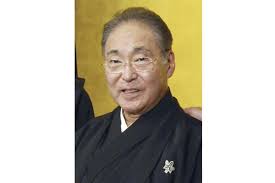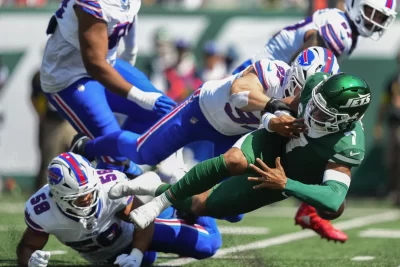
Eno Ichikawa, who revived the spectacular in Japanese Kabuki theater to woo younger and global audiences, has died. He was 83.
Ichikawa died after suffering heart problems on Wednesday in Tokyo, the entertainment company Shochiku Co., a major Kabuki producer, said Saturday.
Ichikawa, or Masahiko Kinoshi, became known for “Super Kabuki,” incorporating modern music and storytelling as well as the circus-like elements of the tradition — such as “flying” supported by ropes — that had been discarded over the years. He focused on what he called the three S’s: “Speed, story and spectacle.”
Kabuki, which features live music and dance on a revolving stage, originated in the 17th Century Edo era and is traditionally performed only by men. So, Ichikawa played beautiful damsels, as well as witches, samurai and even animals throughout his career.
He is best known for bringing back the stunt “chunori,” which translates as “lifted into space,” portraying a joyous fox that receives from a princess a small drum made from the hide of its slaughtered parents.
Hailed as “the rebel in Kabuki” by Japanese media, Ichikawa also created new works. “Yamato Takeru,” based on Japanese mythology and centered on a prince who battles evil forces, debuted in 1986. At the end, the hero transforms into a magnificent white bird that flies through the theater.
Ichikawa not only collaborated with modern writers and composers but also recruited and trained people outside the Kabuki families as actors. That had been unheard of, although such collaborations are routine now due to Ichikawa’s efforts.
After he divorced from actress Yuko Hama, Ichikawa became estranged from his son, Teruyuki Kagawa, a well-known actor in movies and TV shows. They later reunited, and Kagawa took up Kabuki as Chusha Ichikawa when he was in his 40s. Most Kabuki actors start as children, learning the art that is passed down from grandfather to father to son.
“He was an actor who devoted his life to blazing new trails, always with a heart that aspired to fly to the heavens, no matter the obstacles,” Kagawa said in a statement.
“He was truly blessed to have been loved by so many people and for giving his all to his own Kabuki Way.”
Kagawa’s son Danko has now started acting in Kabuki and is on track to inherit the family roles.
“There was so much more I wanted to learn from my grandfather,” Danko said.
“I vow to keep doing my best, never forgetting the drive to soar above and the power to dream that he so treasured,” he added.
Ichikawa continued to act even after suffering a stroke in 2003, delivering his final performance in 2013. He has been honored with numerous cultural prizes, including from the Japanese and French governments.
Tragedy struck Ichikawa’s family earlier this year when his brother and fellow Kabuki actor Danshiro Ichikawa and his wife died in an apparent triple-suicide attempt. Their son, Ennosuke Ichikawa, whose attempt failed, is set to face trial over the deaths.
A public memorial for Ichikawa is being planned for a later date, following family services, according to Shochiku.





